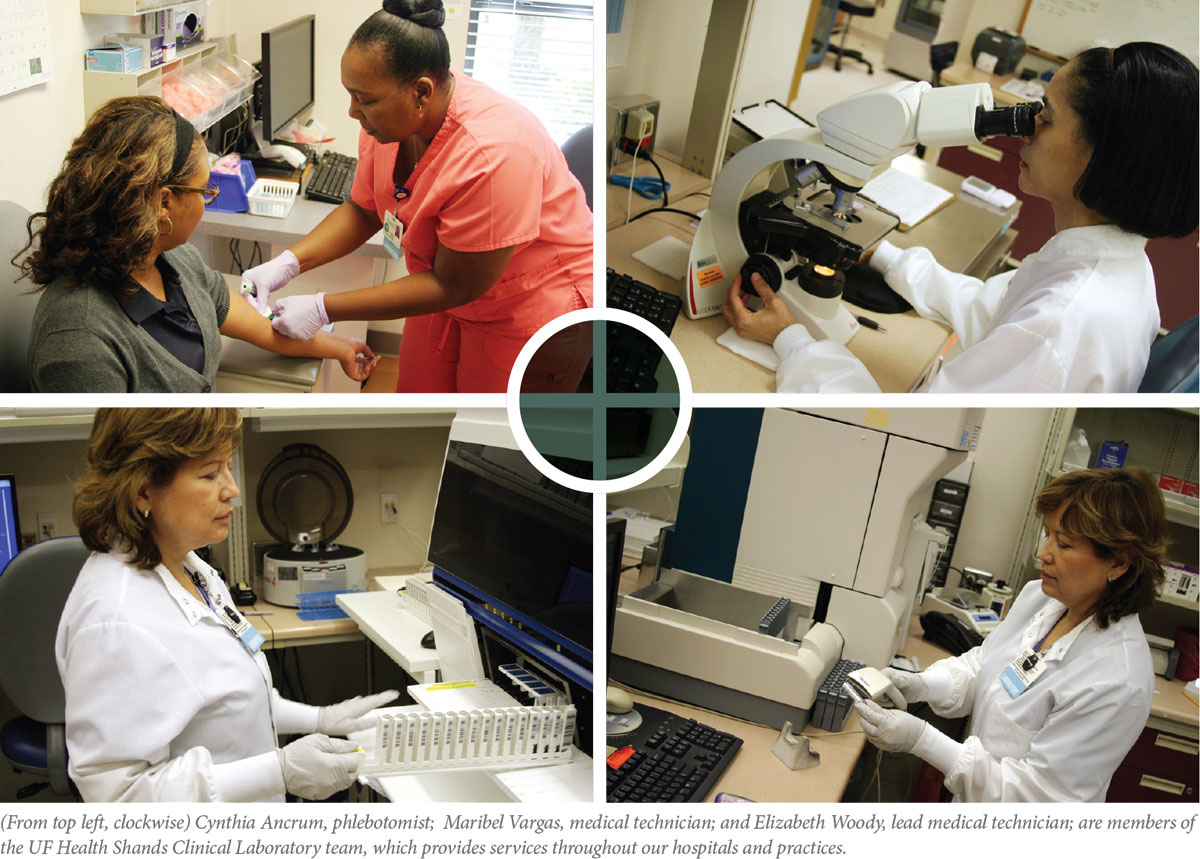Behind the scenes – Laboratory Services
A behind-the-scenes look at a vital team
Many patients will never encounter a member of the UF Health Shands Clinical Laboratory Services team, but their work plays a pivotal role in patient care. “The laboratory operates behind the scenes; however, we know our work directly contributes to the high level of quality care our patients receive here at UF Health,” said Mary Reeves, UF Health Shands Clinical Laboratory Services director.
The team of more than 250 employees performs about 28,400 tests a day — that’s 10.4 million tests a year — and works throughout our hospitals and practices. “The speed and impact of these results serve as reminders to our team members that they are an integral part of patient care,” Reeves said. The following departments and laboratories are some of the key players responsible for the team’s commitment to providing outstanding patient care.
Clinical Laboratory Support Center
For the patient, the Clinical Laboratory Support Center is the face of the Clinical Laboratory Services team. Skilled phlebotomists collect blood from inpatients and outpatients ranging in age from newborns to seniors. The team’s customer service representatives are readily available to support our patients.
Point of Care
Compared with laboratories of the past, today’s are quick. The Point of Care department’s testing enables treatment decisions to be made in near real time — sometimes to save a life, but more often to improve the flow of patient care, resulting in faster discharges and better patient outcomes. Team members provide bedside test results throughout our hospitals and practices.
Core Laboratory and Satellite Laboratories
Located in UF Health Shands Hospital, the Core Laboratory is the team’s main engine. This lab’s staff processes thousands of test results daily, including results for our most complex cases.
In addition to the Core Laboratory, there are two satellite laboratories — the Cancer Center Laboratory, which provides services for UF Health Medical Oncology at the Davis Cancer Pavilion, and the STAT Laboratory, which provides arterial blood gas, whole blood electrolyte and thromboelastographic testing.
If our laboratories can’t provide the onsite testing needed, the Specimen Send Out team can quickly route the samples to specialty testing laboratories.
Anatomic Pathology
The definitive diagnosis of cancer, infections, malfunctioning organs and even cause of death typically requires a pathologist to examine meticulously prepared slides under a microscope. The department’s diverse staff transforms tissues or vials of fluid into slides for diagnosis, teaching or even research resulting in cures, and is made up of the Cytology, Histology, Surgical Pathology and Autopsy teams.
Hematopathology
Leukemia and other serious blood disorders are diagnosed by staff working in this highly specialized laboratory. Information from instrumentation, molecular testing and cytogenetics enable pathologists to provide in-depth diagnoses, including information on the stage of a disease and the patient’s response to treatment.
Transplant — human leukocyte antigen
Our transplant teams rely on the expertise of technologists and pathologists in the Transplant Laboratory to help decide whether an organ or tissue is compatible with the patient, often with the transplant team standing by for results.
Microbiology/Virology
Technologists in this laboratory are the team’s true detectives. Molecular diagnostics can directly reveal pathogens, like viruses. Many other organisms, such as bacteria or parasites, must be grown or diagnosed microscopically. Technologists work to reveal the specific organism, and, if applicable, the antibiotics needed for treatment.
Blood Bank
This department’s mission is to provide lifesaving blood products. Because most surgical procedures require blood, technologists must perform extensive testing to complete a safe transfusion with compatible blood products.
Recent Improvements
• Beaker, the new laboratory information system module in EPIC, fully integrates patient laboratory results into our electronic medical records system. This improvement is scheduled to go live this fall.
• A satellite laboratory for the Adult Bone Marrow Transplant Program in the UF Health Shands Cancer Hospital is scheduled for completion in mid-July.
• The extensive third-floor Core Lab renovation and automation is scheduled for completion in spring 2017. Visit blueprints.UFHealth.org for more information.



